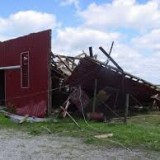Insurer’s failure to “follow up” may attract punitive damages.
On May 4, 2010, the Nova Scotia Court of Appeal held in Kings Mutual Insurance Co. v. Ackermann, that by not following up on all the evidence relevant to the claim, withholding critical information from the adjuster engaged to investigate the claim and allowing the adjuster to present the results of the investigation in a partisan, biased and un-objective manner, the insurer’s actions were such that an award of punitive damages was rationally required to punish the insurer’s conduct.
The insureds were insured for damage to their dairy barn for the peril of a “windstorm”, among other perils. On October 3, 2003, the insureds notified the insurer that their barn had been damaged by hurricane Juan. Upon receiving notice of the loss, the insurer hired an independent adjuster, who in turn hired a professional structural engineer to give his opinion on the damage to the barn and its cause. The insurer’s engineer concluded that “the structural condition of the building had not been affected by the passing of hurricane Juan”. The insureds also hired a structural engineer who found that the barn had, in fact, been damaged by hurricane Juan.
On April 6, 2004, The insureds provided the adjuster with three letters dealing with damage to the barn; one from each of the insured, Leaonard MacPhee, a carpenter, and Brian Chapman, also a carpenter. Both Mr. MacPhee and Mr. Chapman noted that they had witnessed the barn both prior to and after the hurricane and that there was no structural damage to the barn, that they noticed, prior to the hurricane. The insurer did not follow up with, or interview, any of these witnesses.
Prior to hurricane Juan, a safety survey report was conducted, indicating that the barn was in “good” repair and suitable for insurance coverage. This report was forwarded to the adjuster by the insurer shortly after the claim was made. However, the insurer never forwarded the “post-Juan” survey report, which was conducted on June 1, 2004, to the adjuster. Further, the author of these reports, an investigator employed by the insurer, was never interviewed in connection to the claim.
On July 19, 2004, the insureds submitted their proof of loss and their claim was denied by the insurer. The insureds brought an action, which was heard before a civil jury. The jury awarded the insureds the full amount of their insurance coverage, together with punitive damages, in the amount of $55,000. The jury specifically made a finding of bad faith in relation to the coverage denial and found that the insurer’s conduct offended its sense of decency.
On appeal, the court found that on the facts of the case, the insurer’s failure to instruct its adjuster to follow up with the various witnesses, each of whom had first hand knowledge of the pre hurricane state of the barn, was tantamount to ignoring relevant evidence. The court also noted that several comments made in the adjusters report, showing disdain for the insureds’ counsel and expert, and making comments about the mounting costs to the insureds, indicated that the investigation was not undertaken in an unbiased and objective manner. Therefore, the court found that the evidence before the jury supported its finding of bad faith. A reasonable jury could have concluded that an award of punitive damages was rationally required to punish the insurer’s misconduct.





